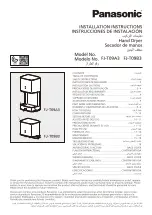
Control settings.
Add Time
Press to add time to the
Steam Dewrinkle
,
Warm Up
,
Air Fluff
or
Time Dry
cycles in 10
minute increments.
3
Temp
You can change the temperature of your dry
cycle.
4
High
For regular to heavy cottons.
Medium
For synthetics, blends and items labeled Permanent Press.
Low
For delicates, synthetics and items labeled Tumble Dry Low.
Extra Low
For lingerie and special-care fabrics.
Level
The sensor continuously monitors the amount of
moisture in the load. When the moisture in your
clothes reaches your selected dry level, the dryer
will stop.
NOTE:
Sensor dry
Level
only works with
Cottons
,
Normal
,
Perm Press
,
Delicates
,
Quick Dry
,
Bulky
,
Towels/Sheets
and
Steam
Dewrinkle
cycles.
5
More Dry
Use for heavy or mixed type of fabrics.
Dry
Use for normal dryness level suitable for most loads. This is the preferred cycle for energy
saving.
Less Dry
Use for lighter fabric (ideal for ironing).
Damp
For leaving items partially damp.
6
Start/Pause
Press to start a dry cycle. If the dryer is running,
press it once and it will pause the dryer. Press it
again to resume the dry cycle.
7
Sanitize
This option reduces certain types of bacteria
by 99.9%, including: Staphylococcus aureus,
Pseudomonas aeruginosa and Klebsiella
pneumoniae*. The anti-bacterial process occurs
when high heat is used during a portion of the
drying cycle.
NOTE:
Do not use this cycle on delicate
fabrics. *The
Sanitize
Cycle is Certified by NSF
International to NSF Protocol P154 Sanitization
Performance of Residential Clothes Dryers.
8
6
Steam Refresh Cycle
For slightly wrinkled dry garments. Significantly
reduces wrinkles on up to 5 garments. After the
Steam Refresh
Cycle, the unit will beep and display
“0:00.” If the unit is not turned off or if the door is
not opened, the dryer will continue to tumble for
30 minutes. At the end of 30 minutes, it will display
“0:00” and the cycle will be complete.
NOTE:
A single extremely light fabric item may
need to have an additional item included to
achieve optimum results.
NSF Protocol P154
Sanitization Performance of
Residential Clothes Dryers







































